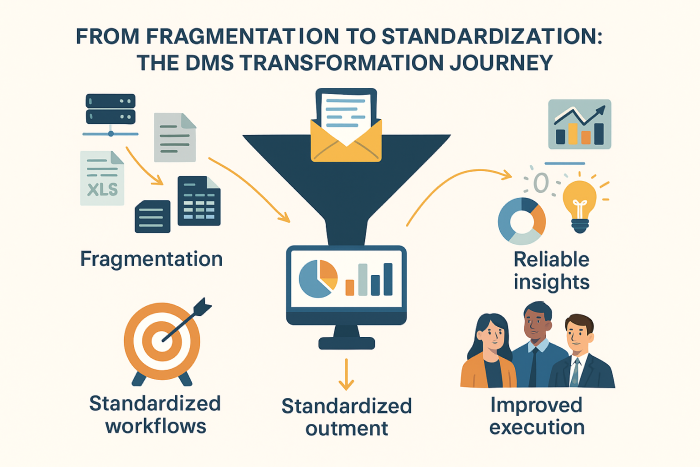Fragmented Systems, Fragmented Operations
In many FMCG, pharmacy, and tobacco distribution networks, operational inefficiency often stems from the absence of standardized Distribution Management System (DMS) processes across distributors. While principals maintain centralized goals and KPIs, each distributor tends to operate with its own workflows, pricing logic, approval flows, and reporting methods. This misalignment typically goes unaddressed until it causes serious bottlenecks.
The result is a fragmented ecosystem where similar tasks are executed differently by region, leading to data inconsistencies, uneven execution, and conflicting performance metrics.
Decentralized Platforms Lead to Decentralized Logic
Distributors often choose DMS platforms based on individual preferences, budgets, or local capabilities. Without governance or standard implementation models, these systems evolve in silos. One distributor might automate returns, while another handles them manually. Trade promotions could be applied at order level in one region, but reconciled monthly in another.
This disparity hampers timely execution and renders cross-regional performance data unreliable. Even simple KPIs like sales per outlet or claim aging lose their validity.
The Illusion of Control Through Manual Intervention
To bridge this inconsistency, many principals rely on manual oversight: Excel templates, weekly calls, and reconciliation workshops. These stopgaps offer temporary control but are labor-intensive, error-prone, and unsustainable. Rather than solving fragmentation, they complicate workflows and delay responses to market shifts.
Manual patchwork only gives the illusion of control while hiding systemic inefficiencies. Over time, it diverts resources away from strategic growth initiatives.
Execution Inconsistency Impacts Market Performance
Non-uniform DMS processes degrade execution quality. A campaign executed perfectly in one region may fail in another due to mismatched approval flows, discount setups, or data formats. Sales teams get confused, field execution becomes inconsistent, and customer experience varies—hurting brand reputation and performance.
It also skews performance comparisons, discouraging teams operating under less optimized conditions.
Data Fragmentation Blocks Strategic Decision-Making
Perhaps the most harmful impact of non-standardized DMS is the inability to extract reliable, real-time insights. Each distributor's unique data definitions, timelines, and hierarchies prevent meaningful aggregation. Regional and head office leaders are left guessing, which hampers strategic planning.
This obstructs visibility into product movement, promotion ROI, and outlet reach. It also delays corrective actions due to unclear or missing data.

Standardization Is Not About Control—It’s About Enablement
Some principals avoid standardization fearing they might overstep. But standardization isn't about micro-managing. It enables agility, transparency, and better collaboration. Standardized processes still allow flexibility, but within a framework that ensures consistency.
This builds trust, enhances coordination, and allows the whole network to perform as a unified system.
Path Forward: Establishing a Unified Operating Model
Addressing this issue requires a clear, shared DMS operating model. Companies must define standard workflows for key processes like order-to-cash, claim management, promo setup, returns, and inventory. Data governance is equally crucial: uniform master data, SKU naming, and KPI definitions.
With a unified model, distributors can either adopt shared platforms or align their existing systems with agreed standards. Outcome-based integration ensures consistent execution logic regardless of tech stack.
Conclusion: Unity at the Core, Agility at the Edge
Without standardized DMS processes, distributor networks remain inefficient and disconnected. When viewed as an enabler rather than a restriction, standardization becomes the key to execution excellence, data reliability, and scalable growth.
It’s time to turn chaos into structure. Flexibility thrives best when it’s built on a consistent foundation.
